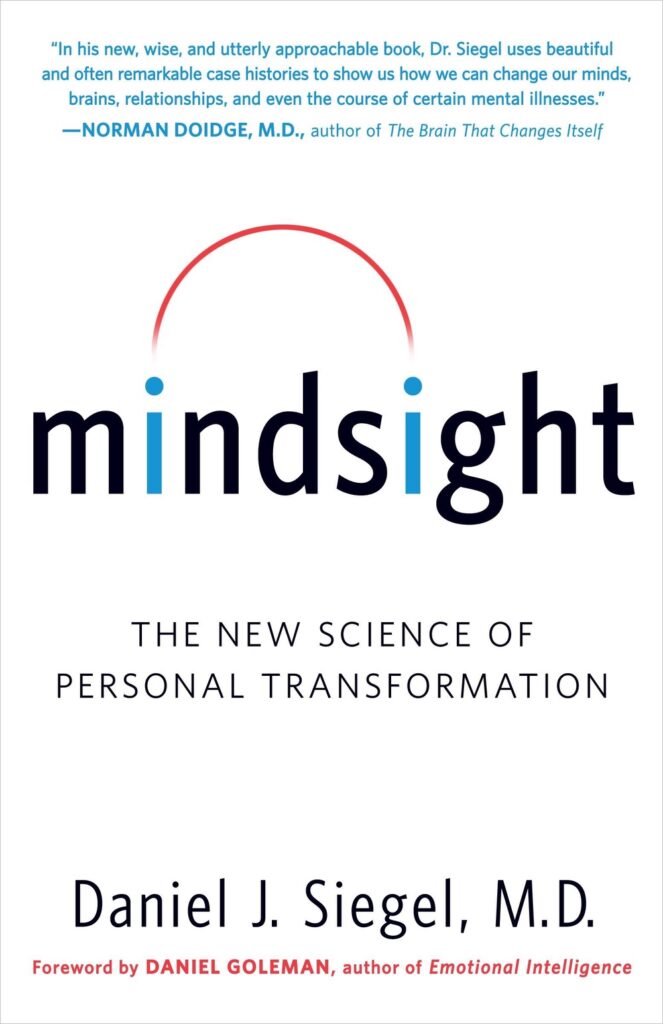Sharing my learnings from the book, Mindsight by Daniel Siegel
Mindsight by Daniel Siegel
A groundbreaking book on the healing power of “mindsight,” the potent skill that is the basis for both emotional and social intelligence. Mindsight allows you to make positive changes in your brain–and in your life. Using case histories from his practice, Dr. Dan Siegel shows how, by following the proper steps, nearly everyone can learn how to focus their attention on the internal world of the mind in a way that will literally change the wiring and architecture of their brain.

- life can be troubling (childhood traumatic events can deeply affect us until old age, body injuries can transform the way we perceive the world & social conflicts can lead to stress & depression). With mindsight, we can apply a set of psychological techniques to help us understand & reshape our inner worlds.
- mindsight is a skill that allows us to reflect on the connection between the body and the mind. This is central to learning how to regulate powerful emotions.
- the goal of mindsight practice is a balanced, harmonic self.
- With a balanced personality, you’ll be able to adapt to external changes, but will also stay stable & true to your core values
- a harmonic personality is tied to creating a balance between rational, analytical thinking & emotional, intuitive thinking.
- mindsight is a brain training that keeps us resilient & emotionally healthy in everyday life
- the prefrontal cortex (located behind the forehead) triggers moral judgments, our attention, sense of time & identity
- the insula is responsible for our emotions and how we respond to the emotional displays of others
- mindsight teaches us how to reflect on thoughts & helps us create new connections between them
- mindsight also trains our brains by boosting memory. Conscious reflection on past or future situations can be as vivid and powerful as experiencing those events themselves
- mindsight helps us train the right side of our brains to acknowledge and manage discomfort
- we can stimulate the right hemisphere of our brain by taking part in nonverbal communication games (imitating facial expressions, trying to read movie character’s emotions w/ sound off) and keeping a diary to record all emotional sensations & imagery of our experiences rather than rationalizing them
- when confronted with our intense emotions, we can try doing a body scan (lying down and focusing on different parts of our body one by one)
- mindsight helps us see how feelings are fleeting experiences, not our defining character traits
- 2 examples of mindsight exercises are mediation and imagining your mind is an ocean. The first train people to focus on one thing and one thing only. The second teaches us that our thoughts & feelings are what moves over the ocean’s surface. No matter how big the waves, there is calmness at the bottom of the ocean
- mindsight exercise are built around 3 key pillars: observation, objectivity & openness. By learning to take all 3 in our stride, we’ll be better positioned to understand our own feelings
- negative childhood experiences might shape how we see our world today, but we can use mindsight to overcome them
- to start, write down as many of our earliest memories as we can, it helps us get everything off our chest and will help us see what narrative we’ve used to make sense of our past as a child. Examine the story and consider the possibility that there is no need for one perfectly coherent narrative. Discovering alternative stories to tell about our childhood & adult life is the 1st step to knocking down those walls we built around ourselves as a kid
- use mindsight to be receptive rather than reactive to your partner when addressing relationship problems. Being receptive means openly listening to your partner. It makes your partner feel like you acknowledge & value their feelings, which in turn helps them open up & share what’s on their mind. Other strategy to try is the timeout method (call a timeout when you sense yourself reaching reactive mode – this gives you time to reflect & rejoin the conversation later).
- mindsight can help us with both past trauma and an uncertain present


Leave a Reply